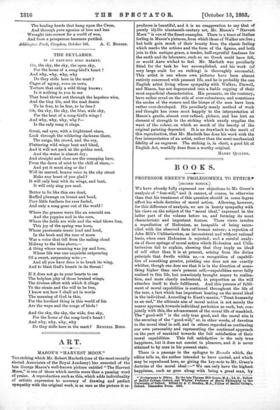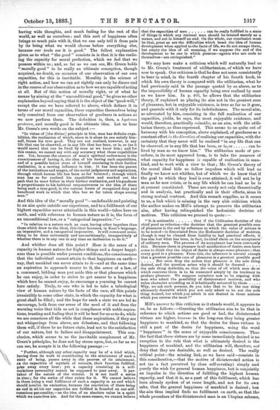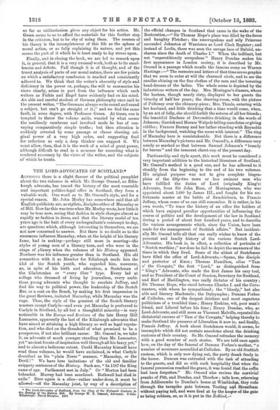BOOKS.
PROFESSOR GREEN'S PROLEGOMENA TO ETHICS.*
[SECOND NOTICE.]
WE have already fully expressed our objections to Mr. Green's. analysis of "free-will," and it cannot, of course, be otherwise than that his treatment of this question should in some degree affect his whole doctrine of moral action. Allowing, however,. for this difference of analysis, we are in hearty sympathy with his views on the subject of the "moral ideal," expressed in the latter part of the volume before us, and forming its most characteristic and important feature. These views involve a repudiation of Hedonism, as incapable of being recon- ciled with the observed facts of human nature; a rejection of John Mill's Utilitarianism, as inconsistent and without rational basis, when once Hedonism is rejected ; and a careful analy- sis of those springs of moral action which Hedonism and Utili- tarianism fail to explain, showing that they imply an ideal of self other than it is at present, arising from the divine principle that dwells within us,—a recognition of capabili- ties of something greater, pointing one does not see exactly whither, though one does see that it is in the direction of some- thing higher than one's present self,—capabilities never fully realised in this life, but consciously brought nearer to realisa- tion, and more clearly understood, in proportion as the will attaches itself to their fulfilment. And this process of fulfil- ment of moral capabilities is continued throughout the life of the race, a fact which has important bearing on the moral ideal in the individual. According to Kant's maxim," Treat humanity as an end," the ultimate aim of moral action is not merely the nearer approach towards individual perfection as such, but, con- jointly with this, the advancement of the moral life of mankind: The " good-will " is the only true good, and the moral aim is the securing of the "good-will," or, in other words, of devotion to the moral ideal in self, and in others regarded as continuing our own personality and representing the continued approach on the part of mankind towards the full satisfaction of their moral capabilities. This full satisfaction is the only true happiness, but it does not consist in pleasure, and it is never attained to by man in his present state.
There is a passage in the epilogue to Romola which, the editor tells us, the author intended to have quoted, and which may be reproduced here, as giving the key-note to Mr. Green's doctrine of the moral ideal :—" We can only have the highest happiness, such as goes along with being a great man, by
• Prolegomena to Ethics. By ths late Thomas Hill Green, N.A., LL.D., Fellow of Balliol College, Oxford. and Whyte.' Professor of Moral Philosophy in the. University of Oxford. Edited by A. C. Bradley, MA., Fellow of BI111101 College. Oxford. Clarendon Press, 1883.
having wide thoughts, and much feeling for the rest of the world, as well as ourselves ; and this sort of happiness often brings so much pain with it, that we can only tell it from pain by its being what we would choose before everything else, because our souls see it is good." The fullest explanation given as to what "the good" consists in is that it is the realis- ing the capacity for moral perfection, which we feel that we possess within us ; and, so far as we can see, Mr. Green holds "morally good" to be really an ultimate conception, though acquired, no doubt, on occasion of our observation of our own capacities, for this is inevitable. Morality is the science of right action, and how we can act rightly can only be discovered in the course of our observation as to how we are capable of acting at all. But of this notion of morally right, or of what he means by aiming at the "unconditional good," he gives no other explanation beyond saying that it is the object of the "good-will," except the one we have referred to above, which defines it in terms of our moral capacities, these capacities themselves being only conceived from our observation of goodness in ;Lotions as we now perform them. The definition is, then, a hysteron proteron, and morally good is the ultimate idea. Let us hear Mr. Green's own words on the subject :—
"In virtue of [the divine] principle in him, man has definite capa- bilities, the realisation of which, since in it alone he can satisfy him- self, forms his true good. They are not realised, however, in any life that can be observed, or in any life that has been, or is, or (as it would seem) that can be lived by man as we know him ; and for this reason, we cannot say with any accuracy what those capabilities are. Yet, because the essence of man's spiritual endowment is the consciousness of having it, the idea of his having such capabilities, and of a possible better state of himself consisting in their further realisation, is a moving influence in him. It has been the parent of the institutions and usages, of the social judgments and aspirations, through which human life has been so far bettered ; through which man has so far realised his capabilities and marked out the path that he must follow in their further realisation, and his goodness is proportionate to his habitual responsiveness to the idea of there being such a true good, in the various forms of recognised duty and beneficent work in which that idea has so far taken shape among men."
And this idea of the "morally good "—undefinable and pointing to an aim quite outside our experience, and to a fulfilment of our highest capacities never attainable in this world—takes here on earth, and with reference to human nature as it is, the form of an unconditional law, or a "categorical imperative :"—
" In relation to a nature such as ours, having other impulses than those which draw to the ideal, this ideal becomes, in Kant's language, an imperative, and a categorical imperative. It will command some- thing to be done universally and unconditionally, irrespectively of whether there is in any one at any time an inclination to do it."
And whither does all this point ? Here is the sense of a capacity in human nature for higher things and a deeper happi- ness than is possible under present conditions, the consciousness that the individual cannot attain to that happiness on earth—
nay, that mankind can never attain to it—and at the same time an aspiration to approach nearer to it, the sense of a law, of a command, bidding man put aside this or that pleasure which he can enjoy, in order to strive to get nearer to a happiness which here he cannot enjoy, to encourage a yearning he cannot here satisfy. Truly, to one who is led to take a teleological view of human nature by the facts of the case, all this points irresistibly to some other state, in which the capacity for what is
great shall be filled ; and the hope for such a state we are led to encourage, both from our sense of the need of it and from the warning voice that bids us act in compliance with noble aspira- tions, trusting and feeling that it will be best for us so to do, while
we are conscious all the while that these aspirations, if they are not whisperings from above, are delusions, and that following them will, if there be no future state, lead not to the satisfaction of our nature, but to failure and disappointment. This con- clusion, which seems to us the inevitable complement of Mr.
Green's principles, he does not lay stress upon, but, so far as we can see, he accepts it in the following passage :—
" Further, although any other capacity may be of a kind which, having done its work in contributing to the attainment of such a state of being, passes away in the process of its attainment, as the capacities of myriads of animals, their function fulfilled, pees away every hour; yet a capacity consisting in a self- coescious personality cannot be supposed to pass away. It par- takes' of the nature of the eternal. It is not itself a series in time; for the series of time exists for it. We cannot believe in there bling a real fulfilment of such a capacity in an end which should invoIve its extinction, because the conviction of there being an end in which our capacities are fulfilled is founded on our self- conscious personality,—on the idea of an absolute value in a spirit which we ours4.11ves are. And for the same reason, we cannot believe
that the capacities of men can be really fulfilled in a state of things in which any rational man should be treated merely as a means, and not in himself an end. On the whole, our conclusion must be that, great as are the difficulties which beset the idea of human development when applied to the fact of life, we do not escape them,. bat empty the idea of all meaning, if we suppose the end of the development to be one in which persons—agents who are ends to themselves—are extinguished."
We may here make a criticism which will naturally lead us to Mr. Green's treatment of utilitarianism, of which we have now to speak. Our criticism is that he does not seem consistently to bear in mind, in the fourth chapter of his fourth book, in which his own theory is compared with the utilitarian, what he had previously said in the passage quoted by us above, as to the impossibility of human capacity being ever realised by man as we know him. In p. 403, he allows that the utilitarian theory, if explained as placing its aim not in the greatest sum of pleasures, but in enjoyable existence, is true as far as it goes, and quarrels with it only for its indefiniteness. The moral aim, as advocated by him, consisting in the full realisation of our capacities, yields, he says, the most enjoyable existence, and would, therefore, practically coincide, as an aim, with the utili- tarian theory, as thus expressed. This seems to us quite out of harmony with his conception, above explained, of goodness as a constant effort in the direction of realising our capacities, with the certainty that they never will be realised "in any life that can be observed, or in any life that has been, or is, or can be
lived by man as we know him." The utilitarian mode of pro- cedure, in its most approved form, is to take the measure of what capacity for happiness is capable of realisation in man- kind, and to work with a view to that ; Mr. Green's theory of
the moral ideal bids us follow impulses which will lead us finally we know not whither, but of which we do know that if the goal to which they lead is ever attained, it will not be by man as he now exists, or in any life which he can lead as he is at present constituted. These are surely not only theoretically and in analysis, but practically and in their effects, aims in strong mutual contrast. And this remark supplies, as it seems to us, a link which is missing in the very able criticism which the author makes on Mill's attempt to preserve the utilitarian aim, after having relinquished the hedonistic doctrine of motives. This criticism we proceed to quote :—
"It is noticeable that if the Utilitarian doctrine of the
chief good as criterion—the doctrine that the greatest possible sum of pleasures is the end by referenoe to which the value of actions is to be tested—is dissociated from the Hedonistic doctrine of motives, though it may be cleared from liability to bad practical effects, it has also lost what has been, in fact, its chief claim on the acceptance • of ordinary men. The process of its acceptance has been commonly this. Because there is pleasure in all satisfaction of desire, men have come to think that the object of desire is always some pleasure ; that every good is a pleasure. From this, the inference is natural enough that a greatest possible sum of pleasures is a greatest possible good But once drop the notion that pleasure is the sole thing desired, and the question arises why it should be deemed the sole thing desirable, so that the value of all which men do or which concerns them is to be measured simply by its tendency to produce pleasure. We suppose ourselves now to be arguing with men who admit the possibility of disinterested motives, and who value character according as it is habitually actuated by them Why, we ask such persons, do you take that to be the one thing ultimately desirable which you not only admit to be not the sole thing desired, but which you admit is not desired in those actions which you esteem the most ?"
Mill's answer to this criticism as it stands would, it appears to us, be as follows :—Granting the utilitarian aim to be that in reference to which actions are good or bad, the disinterested virtues are higher, because in the long-run they bring greater happiness to mankind, so that the desire for these virtues is still a part of the desire for happiness, using the word " happiness " in the sense of enjoyable consciousness. Thus
the fact that these virtues are by some immediately desired is no exception to the rule that what is ultimately desired is the happiness of mankind, and the utilitarian will, therefore, not deny that they are desirable, as well as desired. The really critical point—the missing link, as we have said—consists in this consideration,—that the motive of disinterested action is not (as a fact perceived by close self-scrutiny) simply and purely the wish for general human happiness, but is conjointly an impulse in the direction of fulfilling the highest human capacity, and that it is, as a part of this fulfilment, which has been already spoken of at some length, and not for its own sake, that the general happiness of mankind is desired ; but the aim thus implied finds no fulfilment on earth, so that the whole procedure of the disinterested man is an Utopian scheme, so far as utilitarianism gives any object for his action. Mr. Green seems to us to afford the materials for this further step in the criticism, but to be shy of using them. The essence of his theory is the incompleteness of this life as the sphere of moral action, or as fully explaining its nature, and yet this seems the part of it which he is least ready to lay stress upon.
Finally, and in closing the book, we are led to remark upon it, in general, that it is a very unusual work, both as to its excel- lencies and defects. Full though it is of thought, and of the truest analysis of parts of our moral nature, there are few points on which a satisfactory conclusion is reached and consistently adhered to. We think that the writer's obscurity of style and deficiency in the power or, perhaps, the will to summarise his views clearly, arises in part from the influence which such writers as Fichte and Hegel have evidently had on his mind. An able and careful student of German philosophy once said to the present writer, "The Germans always write round and round a subject, but can't go straight at it;" and we find the same fault, in some degree, with Professor Green. At times, one is tempted to throw the volume aside, wearied by what seems the needlessly cumbrous and involved mode he has of con- veying comparatively simple truths ; but then attention is suddenly arrested by some passage or clause showing ori- ginal power of a very high order, and suggesting food for reflection as only a deep thinker can suggest it. We must allow, then, that it is the work of a mind of great power, although difficult to read in a measure far exceeding what is rendered necessary by the views of the writer, and the subjects of which he treats.




































 Previous page
Previous page